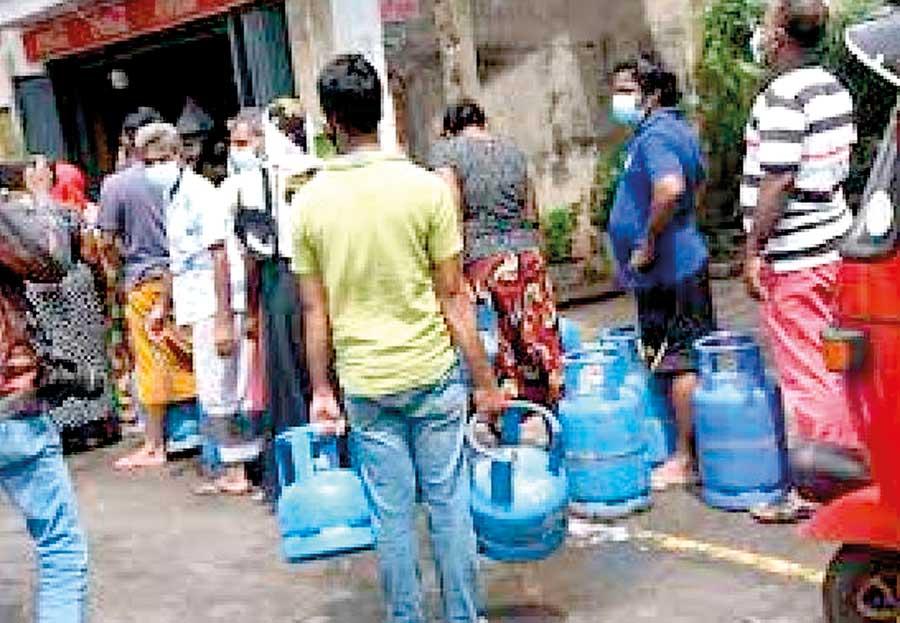21 Feb 2022 - {{hitsCtrl.values.hits}}

Waiting for gas like waiting for Godot. Pic by Akila Jayawardana
It has struck! The curse of ever-increasing debts and the unbearably unpleasant need to go for loans! The whole episode of debts and loans is a sorry tale to tell, depressing and oppressing as it is.
oppressing as it is.
The tragedy is a catastrophic dilemma and a contradiction: the perpetuating crisis of which begets alarming and disturbing repercussions and anxiety. Are we on the verge of a path leading to a nation of hunger and starvation, penniless coffers, debilitated in trade, incapacitated in production both in agriculture and industrial sectors, often disrupted services, unemployment and insecurity as well as inflation and economic depression with bribery and corruption adding to worsening woes in the state and public sectors.
The Corruption Perceptions Index by Transparency International gives us a score of 37 ranking us 102nd most corrupt out of 180 countries.
The status quo has degenerated so much that the all-pervasive rot in the country regarding graft by score seems well below that in Ethiopia, UAE, Qatar, Rwanda, Botswana, Georgia, Malaysia, China, Ghana, Benin, Kuwait, Senegal and Kazakhstan as reported recently.
It is high time that this enormous crisis is given serious attention and measures taken to reverse the situation whilst on a short and long-term strategy heading towards paths of productivity and self-reliance
Debts and loans have sullied our good name as an eternal beggar at the doors of international funding agencies like the World Bank, the International Monetary Fund and the Asian Development Bank.
We have sunk in the depth-slavery of economic dependency and financial indigence for decades since Independence. The dreams for self-reliance and national security that were so well-intentionally espoused by the founding fathers of Independent post-colonial Sri Lanka have fizzled up dismally frustrating.
There is now swarming anger and displeasure in the masses whose cry for even their basic needs is being heard louder and clearer as days go by under the aching strains of the high cost of living, non-availability of food-stuffs, medicines and sky-rocketing prices in commodities including gas and fuel.
The trade union strikes launched often by the Railways Personnel, the teachers, the doctors and the cry of the plantation workers whose pangs are heard from their miserable living conditions and a pittance of salaries are heart-breaking indeed.
The sudden move in the agricultural policy regarding fertilizer change has caused havoc in the work and life of the poor farmers who bear the heat of the day to bring to our homes our staple food and vegetables.
This whole ill-planned shift from chemical to organic has triggered a man-made crop disaster and incurred a massive loss of around US$ 1.04 billion.
Does the Government have a plan to gather the water that comes with torrential rains from the heavens and which can be stored and channelled to the paddy fields to ensure unbroken cultivation during the dry season, instead of letting these waters well up the sea!
We cannot administer our harbours and airports which pushes us to cede them to foreigners on highly questionable deals, often secretive, not debated long enough in Parliament and blissfully unknown to the people to whom this land and its natural resources belong.
Just to mull over the unpleasant data exposed recently in the media: successive Governments have made borrowing amounting to millions of US dollars with much of these funds spirited away through corruption rackets or gone into projects of failed returns.
"Our total outstanding external debt stands at a staggering US$ 35.1 billion. The total foreign debt payment for 2022 amounts to US$ 6.9. billion. The government debt is projected to trend around Rs, 1.5 trillion this year and rise to 2.2 trillion in 2023."
Two sad instances mentioned are the bond scam with its mega-corruption and the Mattala Airport, indeed a white elephant, returning reportedly a monthly pittance of just $ 123 and finally ending up with deficit budgets ranging between US$ 1.8 to over 2 billion.
Our total outstanding external debt stands at a staggering US$ 35.1 billion. The total foreign debt payment for 2022 amounts to US$ 6.9. billion. The government debt is projected to trend around Rs, 1.5 trillion this year and rise to 2.2 trillion in 2023.
The domestic debt service payment in 2022 amounts to around Rs 80.72 billion. Foreign reserves have plummeted from US$ 7.9 billion in 2019 end to 1.6 billion last year.
The largest foreign exchange earner, the remittances, have sunk from $ 7.19 billion to 5.49 billion in 2021, the worst record in South Asia.
The Central Bank was forced to sell half the country’s gold reserves amounting to US$ 382 million.
Agricultural output fell almost to a standstill due to a shortage of agro-inputs. Cooking gas, milk foods shortage have added to the high cost of oil.
The pandemic of course affected tourism badly which in 2018 raked in more than US$ 4 billion with the best of arrivals totalling 2.3 million.
Losses were aggravated by the drop in migrant worker remittances and the deficits incurred in the country’s multi-billion trade and current account. So there is an urgency for restructuring of debt for loan payment.
The economic situation is sinking at an alarming rate. There is a need of catering to the needs of 70% of the country’s informal labour force.
Compensation for farmers at the rate of Rs 100,000 per acre, would require more than Rs 40 billion that has to be drawn from taxpayers’ monies.
While Railways Personnel, teachers, plantation workers and medical personnel brace for strikes, these rising debt payments have forced the Government to tighten domestic borrowings while controlling expenditure of Ministries and State institutions.
Angry outbursts of criticism have been aired already against the Government’s pending pillage of the EPF/ETF funds which are the hard-earned savings of the people: a brazen infringement on human rights: a kind of pick-pocketing, as dubbed, an estimated Rs, 65 billion from these national assets running into trillions.
How to tide over this oppressive and depressing condition of the national economy? First of all, the export sector has to be strengthened with the modernization of the traditional exports of tea, rubber and coconut.
The apparel and garment industries have to be embellished and creative trade introduced with many a local raw material that is available here such as minerals and metal resources. The garment export revenue had come down to US$ 4.4 billion in 2021 from that of $ 5.6 billion the previous year.
Recently there was a very practical proposal to take urgent steps to increase Sri Lanka Small and Medium Enterprises contribution to the GDP. This sector is reported to make up a sizable part of the national economy accounting for 90% of all business enterprises and happens to be an essential source of employment opportunities contributing to 45% of jobs.
So they are a golden means to inclusive growth. Amidst negatives, there is some positive news about Sri Lanka software with its 100% contribution to the GDP earning $1.5 billion and which sector can go for a galloping growth with more incentives. There is naturally an urgent need to stimulate more FDI s learning from our neighbours such as India which had attracted $200 billion, Bangladesh $20 billion while Sri Lanka had managed just US$ 389 million, a shocking loss from 2018 $ 1.5 billion.
What about tapping solar energy in a country where there is so much sunshine but at the moment generating only 1% of what is required. It had been observed that in Europe with just four months of summer, 50% of their power is generated from renewable energy.
And of course, our financial debris is caused also by the ever accusation of human rights violations, justice not meted out to victims of terror and war crimes and slowness in establishing human rights and work for national reconciliation.
Every year this sordid tale of human rights comes up at the UNHRC sessions and we do not respond effectively to this debacle.
The general feeling abroad that not all steps are being taken and explored towards reconciliation, justice and accountability and communication of the same to domestic stakeholders and the international community, still darkens the national horizons. Human rights, Rule of Law and good governance are key conditions for a healthy administration of a country. The root cause of this miserable state of affairs has to be laid squarely on rotten politics, callous administration, bribery and well corruption. Because of serious doubts they entertain on these issues, many western countries are reluctant to help and collaborate. Reconciliation will involve equality of opportunity, access to justice, and political representation for all communities in the country. The issue has been raised recently once again about the devolution of power and not just de-centralization in making the provincial councils become effective structures of truly participatory democracy.
In this light, the 13th amendment to the constitution has to be re-activated. The devolution issue was mooted already in the Indo-Lanka Accord of January 1987 leading to establishing the Provincial Council System as a means of devolution of power. It was to affect profoundly the Tamil speaking people in North and East enabling them to live in security in the areas of their historical habitation exercising the right to self-termination within the framework of a united and undivided country, as they wrote seeking the intervention of the Indian Prime Minister in their recent plea. Resolving the national issue of reconciliation and the work for transitional justice will usher in a favourable atmosphere for working on the national economy now in tatters.
28 Nov 2024 17 minute ago
28 Nov 2024 2 hours ago
28 Nov 2024 5 hours ago
27 Nov 2024 8 hours ago
27 Nov 2024 9 hours ago